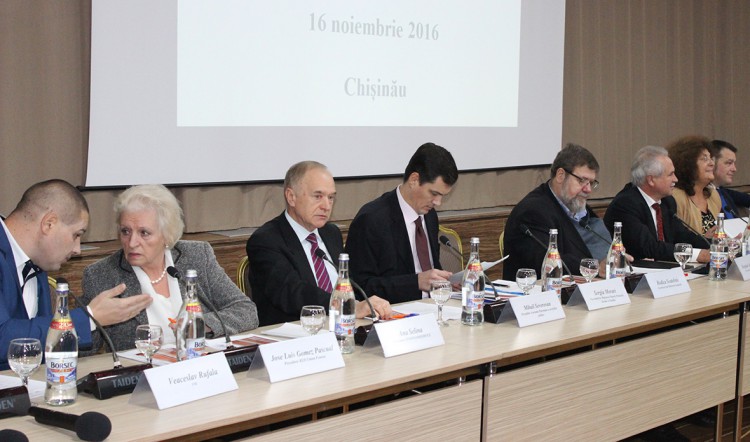Social Dialogue Forum “Strengthening social dialogue in Moldova”
Social partners from the public service sector of Moldova, officials and European trade unionists attended on Wednesday, November 16, the Social Dialogue Forum “Strengthening social dialogue in Moldova”.
The event was organized by the Public Services International (PSI), in collaboration with the Netherlands Trade Union Confederation (FNV) and PSI affiliates from Moldova: Trade Union Federation “SĂNĂTATEA”, Trade Union Federation of Workers from Sphere of Social Service and Manufacture of Goods “SINDINDCOMSERVICE”, Trade Union Federation of Public Services Employees “SINDASP” and the Trade Union Federation of Energy and Industry “USE”.
During the discussions, the participants addressed a number of issues related to social dialogue in the country on the implementation of the Moldova-EU Association Agreement and the public sector’s role in this process.
Sergiu Morari, head of labour relations and social partnership direction, Ministry of Labour, Social Protection and Family, mentioned that the Moldova-EU Association Agreement provides the involvement of the social partners on issues of national interest, including the development and coordination of all draft legislation related to labour and social-economic field. “Our country has already formed a practice in this sense, and one of the ways to involve social partners is the work in working groups. This year, a group of this kind worked on the bill to amend the Labour Code, another – a draft law to reduce the administrative burden on employers, and a recently created working group will examine the appropriateness of drawing up a new Labour Code,” he said.
Another form of cooperation of social partners is negotiation and conclusion of collective agreements at national level. So far, 15 such documents have been signed.
“It is expected that by the end of this year, social partners to come up with proposals to improve social dialogue at sectoral level, but also to examine the possibility of conducting bipartite negotiations,” added Morari.
Sergiu Sainciuc, vice president of CNSM, reiterated the need to include in the national legislation bipartite social dialogue at sectoral level, especially in the context of optimizations that will take place in the government’s structure. He said that CNSM has already prepared proposals to amend Law no. 245 on the organization and functioning of the commissions for consultations and collective bargaining at all levels, because in some branches the deployment of social dialogue is unsatisfactory.
About this issue also talked Aurel Popovici, president of the Trade Union Federation “SĂNĂTATEA”, adding that if at branch level there are some negotiations, than at unity level the situation is quite worrying. Of the 248 units, in only 120 are commissions for consultations and collective bargaining.
An obstacle to the smooth conduct of social dialogue in the Republic of Moldova is poor organization or lack of employers’ structures at branch level and territory, believes Marina IRIMIE, PSI Coordinator for Southeast Europe.” When these structures will be fine-tuned, we can talk about a functional and efficient dialogue”, she said.
During the forum, contradictory discussions have aroused the topic of pension system reform in the country.
Vlad Canțîr, president of the Trade Union Federation of Public Services Employees “SINDASP” addressed the issue of unification of the pension system, expressing his disagreement in this respect.
In this context, Sergiu Sainciuc stressed that reforming the pension system is necessary, but this must be done not at the expense of citizens, but in their favour, while stating that CNSM does not accept the proposal to increase the retirement age for men and women.
On the other hand, Bogdan Iuliu Hossu, president of Cartel ALFA Romania and vice president of the Association for Romania’s EU integration, said that increasing the retirement age is an imminent action, which will help ensure the sustainability of the Moldovan pension system and unification of the pension system will assign its equity. “Ensuring equal opportunities between women and men requires equalizing the retirement age. In all developed countries, the retirement age is the same for men and women. The practice that is performed outdoors, but not taken into account in Central and Eastern Europe, is that for every child born a woman receives a reduction in the retirement age, reducing also the period of contribution between 1 and 2 years (variable for each country),” he explained.
Valentina Stratan, deputy, vice president of the Parliamentary Committee on Social Protection, Health and Family, said that unification of the pension system will bring change in the coming years. “Yes, the reforms will be tough but we need the support and understanding of people. We do not propose an overnight reform, the changes will be made gradually “, she said.
Participants in the debates expressed on the authorities’ intention of drafting a new labour code. Sergiu Sainciuc informed that trade unions advocate more on the improvement and adjustment to current labour market requirements than on drafting a new document, which is a more than difficult process.
In turn, Bogdan Iuliu Hossu urged Moldovan trade unionists to be more insistent and to defend their rights. “No one forces you to make unwanted changes. It is important to note that social dialogue is a tool, not an end, his role being to place all players at the negotiating table and discuss a compromise acceptable to all parties,” he concluded.
Department of mass media and international relations



